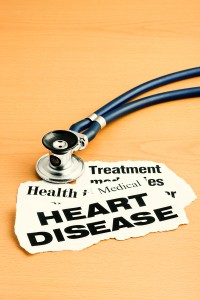Every year, more than 1.2 million Americans die from heart attacks. According to the Centers for Disease Control and Prevention, almost 50 percent of those deaths occur outside the hospital—a figure suggesting many people with heart disease don’t act on early warning signs.
“Chest pain or discomfort that lasts more than a few minutes is a primary heart attack symptom,” says Dr. Robert Mendelson, Director of Cardiology at Jamaica Hospital. “Shortness of breath, cold sweats, nausea, lightheadedness, and upper body discomfort are also red flags and an indication to immediately call 911. Just a few wasted minutes can stand between life or death.”
 There are several factors that can put you at risk for heart disease, including high blood pressure, having high cholesterol, being overweight, smoking cigarettes, having diabetes, and being over 55 years old for men and 65 years old for women.
There are several factors that can put you at risk for heart disease, including high blood pressure, having high cholesterol, being overweight, smoking cigarettes, having diabetes, and being over 55 years old for men and 65 years old for women.
Despite having these risk factors, it is possible to protect yourself against the biggest heart health conditions. Dr. Mendelson encourages individuals to maintain a nutritious diet, exercise regularly, manage stress, and quit smoking. In addition to making healthy lifestyle changes, other ways to manage heart disease include medication and invasive procedures, such as pacemakers and stents.
Jamaica Hospital Treats Heart Attacks and a Wide Variety of Heart Diseases
Jamaica Hospital offers comprehensive cardiac care, including swift interventions for heart attack and services for heart diseases such as arrhythmias, coronary heart disease, and cardiomyopathies.
Our cardiac catheterization laboratory performs diagnostic cardiac catheterizations to identify blockages in the arteries bringing blood to the heart. It performs angioplasty and stent implantation to open the arteries that are found to be blocked. Blockages in the arteries in the legs are also diagnosed and treated with stents.
Our noninvasive Cardiology laboratory performs the following tests:
• Electrocardiograms, which allow the electrical activity of the heart to be examined
• Echocardiograms, which use sound waves to take pictures of the heart to assess how it is working
• Stress tests, both chemical and exercise, with and without imaging, to assess the blood flow to the heart and the function of the heart with exercise
• Holter monitors
• Event recorders
• Tilt table testing
• Nuclear wall motion studies
• Signal-averaging electrocardiography
• Pacemaker and automatic implantable defibrillator evaluation
• Ambulatory blood pressure monitoring
We also offer an arrhythmia service, where abnormal heart rhythms can be diagnosed and treated using invasive electrophysiologic testing. Medical treatment of coronary artery disease is available for patients who are not candidates for angioplasty, stenting, or coronary artery bypass surgery, but who have continued chest pain or angina.
To speak with a cardiologist about your heart health or to obtain more information about the cardiology services offered at Jamaica Hospital, please call 718-206-7100.
All content of this newsletter is intended for general information purposes only and is not intended or implied to be a substitute for professional medical advice, diagnosis or treatment. Please consult a medical professional before adopting any of the suggestions on this page. You must never disregard professional medical advice or delay seeking medical treatment based upon any content of this newsletter. PROMPTLY CONSULT YOUR PHYSICIAN OR CALL 911 IF YOU BELIEVE YOU HAVE A MEDICAL EMERGENCY.
